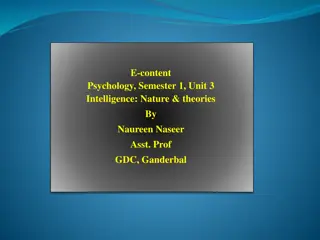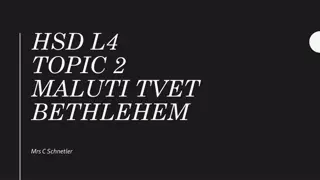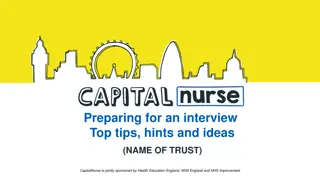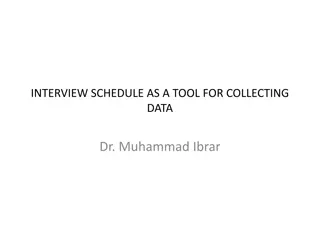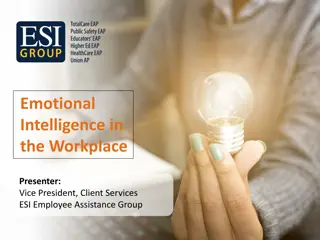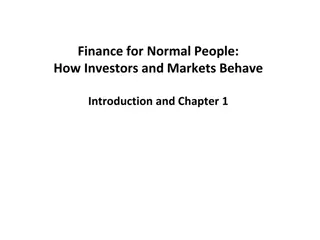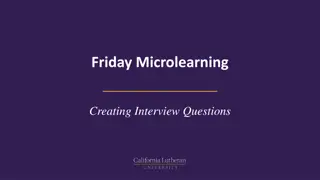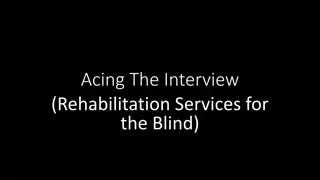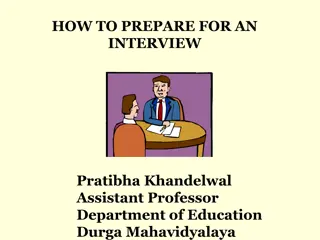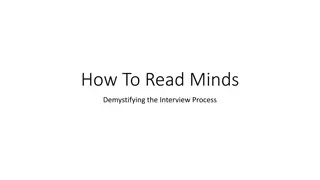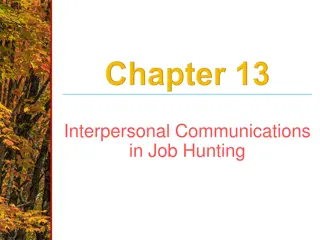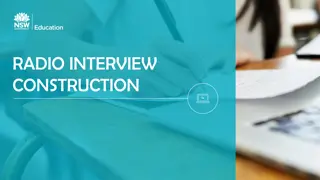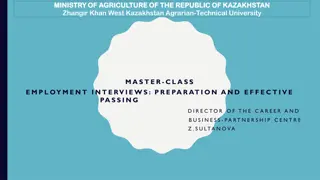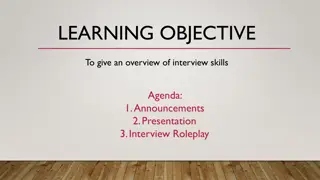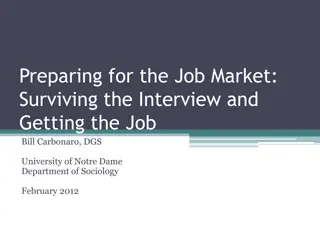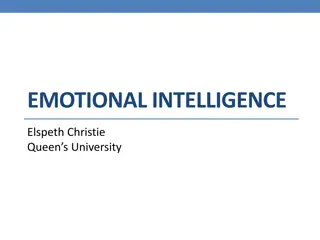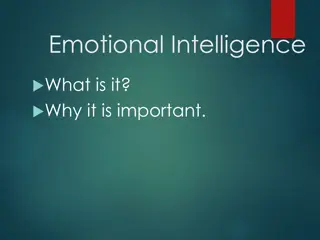Enhancing Emotional Intelligence Through Behavioral Interview Questions
Explore the key aspects of emotional intelligence, including social-emotional competencies and cognitive, affective, and behavioral competencies. Learn how to conduct interviews focused on emotional intelligence and discover the importance of relationships, self-awareness, responsible decision-making, and other essential skills for personal and professional growth.
- Emotional intelligence
- Behavioral interview
- Social-emotional competencies
- Self-awareness
- Responsible decision-making
Download Presentation

Please find below an Image/Link to download the presentation.
The content on the website is provided AS IS for your information and personal use only. It may not be sold, licensed, or shared on other websites without obtaining consent from the author. Download presentation by click this link. If you encounter any issues during the download, it is possible that the publisher has removed the file from their server.
E N D
Presentation Transcript
Conducting Interviews with Conducting Interviews with Behavioral Behavioral- -Based and High Based and High Emotional Intelligence Questions Emotional Intelligence Questions Dr. Terry McDaniel Indiana State University
Imagine the best teacher you ever had in Imagine the best teacher you ever had in school school Did that teacher: Have a personal relationship with you? Make responsible decisions? Recognize your potential? Push you toward higher goals? Appreciate not only you but the other students as well? Have good self awareness? Have good social awareness?
Social Emotional Competencies Social Emotional Competencies Recognize and manage emotions Set and achieve goals Appreciate the perspectives of others Establish and maintain positive relationships Make responsible decisions Handle interpersonal situations constructively (Durlak, Weissberg, Taylor, & Schellinger, 2011)
Five Interrelated Cognitive, Affective, and Five Interrelated Cognitive, Affective, and Behavioral Competencies Behavioral Competencies Self Awareness; the capacity to reflect on one s own feelings, values & behaviors Social Awareness; Ability to view situations from a different perspective . Respect for social & cultural norms of others celebrates diversity Relationship Skills; ability to initiate & sustain positive connections with peers, teachers, families, and others Self-Management; includes self-motivation, goal setting, self-discipline, personal organization, impulse control, strategies for coping with stress Responsible Decision Making; the ability to make choices that consider the well-being of others. (Collaborative for Academic, Social, and Emotional Learning [CASEL], 2005)
Three Domains of SEL Cognitive Regulation; attention control, inhibitory control, working memory &, cognitive flexibility planning Emotional Processes; emotion knowledge and expression, emotion & behavior regulation, empathy or perspective taking Social/Interpersonal Skills; understanding social cues, conflict resolution & prosocial behavior (Jones, Bailey, Brush, & Kahn, 2018)
Indiana Workforce Development: Indiana Workforce Development: Indiana s Employability Skills Benchmarks Indiana s Employability Skills Benchmarks Mindsets: Intellectual Risk Taking Appreciation of Diversity Self Confidence Sense of Belonging Career Path Self-Management Skills Pride in Work Self-Discipline Independence Perseverance Stress Management Time Management Adaptability Integrity Professionalism Work Ethic
Learning Strategies Written Communication Decision Making Initiative Technology Savvy Attention to Detail Organization Information Gathering Problem Solving Social Skills Oral Communication Teamwork Leadership Conflict Management Self-Advocacy Workplace Skills Personal Safety Follows Directions Resource Allocation Customer Service Indiana Indiana Workforce Workforce Development: Development: Indiana s Indiana s Employability Employability Skills Skills Benchmarks Benchmarks
Indiana Department of Education: PK-12 Social-Emotional Learning Competencies
Growth Mindset Growth Mindset We have to have teachers who have a growth mindset. They must believe students can achieve at least a year s growth every academic year. They must own the responsibility for students to learn and grow. They do not make excuses for failure. The ability to demonstrate cognitive flexibility and a willingness to learn. Developing mindset is a critical learning skill for building perseverance, adaptability, self-discovery, resilience and the ability to give and receive constructive feedback.
Mindset: Grit; Passion and Perseverance Mindset: Grit; Passion and Perseverance Teachers must believe in the student. The teachers must have a passion to desire to make a difference in a child s life. They treat every child as if that child was their own. They make no excuses. They are willing to try new innovations to make the difference in a child succeeding. They model what they expect from the child. They have a never give up attitude.
Mindset: Mindset: Collective Teacher Efficacy Collective Teacher Efficacy Student Expectations Student Expectations Teacher Expectations Teacher Expectations They are an advocate for all teachers working together for the success of students. They are willing to collaborate and share knowledge, skills, and techniques. They set high expectations for their students and will do whatever is necessary to help the student attain those goals. They teach students to set high expectations for their learning. They expect students to own their learning. They use formative assessment and feedback as keys for teaching. They facilitate learning. These teachers have high creditability with students.
Critical Thinking Critical Thinking The ability to make constructive choices and metacognitive strategies to enhance learning. Critical thinking skills build responsible decision- making, analytical and critical inquiry skills, which are necessary to approach learning from an innovative, creative, multicultural and ethical lens. Teachers need to be aware of teaching to the higher order thinking skills or evaluation and synthesis. In strong teaching the student are asking the questions, especially the why questions, not the teacher.
Insight Insight The ability to know your emotions and how they affect your thoughts and actions. Gaining insight is an important skill for building self confidence, self esteem, and empathy for others. Insight helps students recognize their strengths and areas for growth. How do your teachers feel about their self confidence and self- esteem? Do they model confidence in their abilities? Do students see them as credible?
Collaboration Collaboration The ability to work well with others including a group and teamwork environment. Collaboration works to build positive commutation and conflict management skills. As a leader you need to know if a new teacher can work with others. How do they handle conflict? Is their communication a reflection of a growth mindset? Are they willing to ask questions about the things they do not understand? Do they contribute to meaningful discussions?
Connection Connection The ability to understand and respond to the needs of others. Gaining connection skills leads to effective communication, perspective taking, and helps develop cultural sensitivity. Does the teacher see beyond the academic needs of the student? Is the teacher aware of the culture of the student? Does the teacher recognize the needs of each student? Is the teacher aware of all the variables affecting the development of the child?
Regulation Regulation Ability to recognize and manage one s emotions. Regulation skills build positive self-control, self-discipline and impulse control. A teacher must have personal regulation skills before he can develop those same skills in students. What skills does the teacher possess to respond to students who lack regulation? Are they able to keep a growth mindset when working with regulation? Do they demonstrate perseverance in working with student who struggle greatly in the area of regulation?
Sensory Sensory- -Motor Integration Motor Integration The ability to have body awareness and to recognize sensations in the body. It is an important skill for managing transitions, changing routines, increasing alertness for learning and improving regulation. Is the teacher aware of the need teach transitions skills to students? Can the teacher identify the physical signs and clues that indicate student struggles with sensory motor integration?
A persons ability to manage self as well as relationships with others It is the skills that drive our internal world and our external world. 1. Self Awareness and Self Control 2. Empathy 3. Social Expertness 4. Personal Influence 5. Mastery of Purpose and Vision Emotional Intelligence
Behavioral Interviews In behavioral interviews, candidates are asked how they handled past situations, giving you a sense of how they will think and perform in the future.
Hiring Mistakes Most interview mistakes are made in the first few minutes of the interview. First impressions, personal biases, stereotypes and prejudices unconsciously come into play when the interviewer and candidate meet in person for the first time. If an interviewer doesn t like someone during this brief encounter, the person will not get hired. Competency is irrelevant. If the interviewer likes the person, competency is overlooked. Strengths are magnified and weaknesses ignored.
Instead of using skills and qualifications to assess competency, define what the person must do to be successful. Get detailed examples from the candidate of comparable accomplishments. Evaluate these accomplishments over time, and look for their trend and growth. This is how to define and measure performance. All candidates need to be asked the same questions, whether you like them or not.
30 Minute Cooling Off Don t fall in love on the first date!!! Get examples of comparable accomplishments, especially during the critical first 30 minutes. After 30 minutes, measure your first impression again. You ll discover that about a third of the candidates are far stronger than first imagined, and about a third are not nearly as strong as you thought. This 30-minute delay will allow you control your biases and prejudices. We all have them, but disciplining yourself this way helps you overcome them. The biases will reveal themselves
Self Awareness and Self Control Tell me about a time when you did something that had a positive impact on a coworker, a friend, or a student. Tell me about a time when you did something that had a negative impact on a coworker, a friend, or a student. How do you know if your words have a positive impact on others? How do you know if your words have a negative impact on others? Describe a time when you knew you said or did something that caused a problem for someone. How did you know it caused a problem? What did you learn from this experience? (Lynn, 2008)
Self Awareness and Self Control Self Awareness and Self Control Assessing Observation Skills Assessing Observation Skills Have you ever noticed someone was having a bad day? How do you know? What do you do? Have you been in a situation where you thought you need to change your behavior? How did you do it? Have you ever noticed you were annoying someone? How did you know? What did you do? (Lynn, 2008)
Self Awareness and Self Control Self Awareness and Self Control Assessing Awareness of Assessing Awareness of Emotions or Thoughts Awareness of Awareness of Triggers Triggers Emotions or Thoughts and and Tell me about a time when the mood of a student or coworker affected you? Describe a time when you knew your mood was affecting your behavior at work. Tell me about situations or people that annoy you as a teacher. What situations bring out your best at work? How do you behave at those times? What situations bring out your worst at work? How do you behave at those times? What do you do about this? (Lynn, 2008)
Self Awareness and Self Control Self Awareness and Self Control Assessing Assessing Reflection Skills Reflection Skills and and Skills and Abilities Skills and Abilities Tell me about a lesson or an event in which you had responsibility at work that did not go well. Who s fault was it? Tell me about a time when others did not cooperate with you. How would you analyzed the situation? Have you ever unintentionally insulted or offended someone? How did you handle it? Tell me about an evaluation you have experienced. How did you handle the positive and the negative feedback? Have you ever been surprised by criticism you have received? How did you react? Tell me three things you have learned about yourself over the past year that are related to how you would teach. How did you learn this information (Lynn, 2008)
Self Control or Self Management Self Control or Self Management A Assessing Appropriate Emotional Expression ssessing Appropriate Emotional Expression Tell me about a time when you were angry at someone at work? Tell me what you do in those situations. What do you do when you are stressed at work? When do you look forward to going to work? Has there ever been a situation at work where you said something and later regretted saying it? Tell me about that. (Lynn, 2008)
Self Control or Self Management Self Control or Self Management Assessing Courage or Assertiveness Assessing Courage or Assertiveness Tell me about a time when you spoke up about something in the workplace. What was the issue? Why did you speak up about it? What did you say? What did others think? Describe a time when you and a peer were at odds about a particular decision or direction. What did you do? Describe a difficult performance discussion you had with an employee. Tell me about a time when you decided not to discuss an issue with a colleague. (Lynn, 2008)
Self Control or Self Management Self Control or Self Management Assessing Resilience Assessing Resilience Tell me about a time when you felt defeated at work. Tell me about a time when you felt like giving up on something. What did you do? Tell me about a time when you were overwhelmed at you last job. How often does that occur? What did you do about it? Talk about the last time you were criticized at work. How did that go? (Lynn, 2008)
Empathy Empathy Assessing Assessing Respectful Listening Respectful Listening and and Feeling the Impact on Others Feeling the Impact on Others Think about a time when you did not understand something in the workplace. What did you do? Describe a time when you jumped the conclusions. Tell about a time when you learned something by listening to a colleague. Tell me about a time when you sensed something was bothering a student. How did you know? What did you do? Describe a time when you said or did something that had a negative effect on a student. Tell me about a time when you noticed a student was overwhelmed or struggling with social or emotional issues. (Lynn, 2008)
Social Expertness Social Expertness Assessing Building Relationships Assessing Building Relationships Tell me about a time when you were able to get something done at school because of the relationship you had with another person. Tell me about some of the people whom you have to work with on a regular basis that you find difficult to get along with. What have you done to build stronger relationships with these people? Tell me about a situation when you won someone over at school. Whet at did you do? What do you do that makes you a good follower? (Lynn, 2008)
Social Expertness Social Expertness Assessing Collaboration Assessing Collaboration Tell me how you recently solved a school work problem. Have you ever implemented an idea or solved a problem and had your solution met with resistance? What do you think you could have done to avoid the resistance? Was there ever a time where you rejected someone s idea or opinion? Tell me about that. Describe a time when your input improved someone s work. Have you ever offered an idea or opinion at school had had nothing to gain from it? Tell me about that. (Lynn, 2008)
Social Expertness Social Expertness Assessing Conflict Resolution Assessing Conflict Resolution Tell me about a dispute with a peer or student. What was it about? What did you do? How did it end up? Have you resolved differences with colleagues or students? Tell me about the process you used to resolve the differences. Have you ever encountered someone at school who was unreasonable? What did you do? Describe a time when someone felt you were unfair. What did you do? Relate an incident when someone verbally attacked you about something you said or did. What did you do? (Lynn, 2008)
Personal Influence: Influencing Self Personal Influence: Influencing Self Assessing Self Assessing Self- -Confidence Confidence Tell me about a time when you took on a task that you considered out of your confidence zone. How did you feel? Why did you do it? Did you think you were going to succeed or fail? If you were going to try to persuade me regarding something, how would you do it? Tell me about your strengths. How do you know they are your strengths? How do you measure your strengths? What feedback have you received that indicates the quality is a strength? How do you think you will perform in this teaching position? (Lynn, 2008)
Personal Influence: Influencing Self Personal Influence: Influencing Self Assessing Initiative and Accountability Assessing Initiative and Accountability Have you ever made improvements to your work without being asked? Give me some examples. How did you do it? Have you ever taken the initiative to do something that did not work out? Describe the situation. What did you do? Who do you feel about that? Have you ever done something and gotten blamed when it did not work out? Describe what happened. How did you feel? (Lynn, 2008)
Personal Influence: Influencing Self Personal Influence: Influencing Self Assessing Goal Orientation Assessing Goal Orientation Describe the goals at your previous position. How were these determined? Did you meet the goals on a regular basis? Have you ever though goals were unrealistic? Have you ever had a goal you did not meet? How did you feel about that? What goals do you have right now? What goals did you accomplish last year? Have you ever helped student set goals? (Lynn, 2008)
Personal Influence: Influencing Self Personal Influence: Influencing Self Assessing Optimism Assessing Optimism Tell me about lesson that you knew was not going to be effective. How did you know? Describe a time when you tried something new at school. How did that work? Would you do it again? Why or why not? Describe a time when you were more optimistic that you colleagues at school about a particular event or project. What did you do? Tell me about a time when a colleague was negative about an outcome. How did that affect you? (Lynn, 2008)
Personal Influence: Influencing Self Personal Influence: Influencing Self Assessing Flexibility and Adaptability Assessing Flexibility and Adaptability Describe a time when you had to change your plans to accommodate a situation or colleague. Howe did you feel about that? Describe a time when you had to learn something new. How did you feel about that? Have you adapted to the change? Give an example when you were flexible. Give me an example when you were not flexible. Tell me about a time when it was necessary to bend the rules. Have you ever been flexible and later regretted it? (Lynn, 2008)
Personal Influence: Influencing Others Personal Influence: Influencing Others Assessing Leading Others Assessing Leading Others Describe a time when you took charge of a situation. Tell me about a time when the student relied on you and followed your lead. How do you influence people and students? Describe a time when a student resisted following you. Give me an example of when you have influenced colleagues. (Lynn, 2008)
Personal Influence: Influencing Self Personal Influence: Influencing Self Assessing Getting Results Through Others Assessing Getting Results Through Others Describe the results you achieved in your position last year. Have you ever set a goal too low for students? Have you ever shared successful teaching units, strategies, or instructional skills with a colleague? Have you ever reached out to a colleague to get assistance in helping your students? Tell me about a time when you were wrong in the way you addressed a student of colleague about a situation? (Lynn, 2008)
Mastery of Purpose and vision Mastery of Purpose and vision Assessing understandings One s Purpose and Values Assessing understandings One s Purpose and Values Tell me about a time when you felt bored at work. Describe your ideal teaching situation. Describe the worst possible situation for you as a teacher. How did you decide to become a teacher? What influenced you? What actions did you take to end up in this field? What do you like about teaching? Would you encourage other to enter into the field of education? (Lynn, 2008)
Personal Influence: Influencing Self Personal Influence: Influencing Self Assessing Authenticity Assessing Authenticity Tell me about a time in school where you had to compromise your beliefs or values. Hoe do you gain people s trust? What do you do? What actions do you take? Tell about a time when you lost someone s trust. Describer how you know you have honored the commitments you have made to others. Tell me about a time when you failed to honor a commitment. (Lynn, 2008)
References Carter, S, C, (2000). No excuses: Lessons from 21 high-performing, high-poverty schools. Washington DC: The Heritage Foundation Duckworth, A. (2016). Grit; the power of passion and perseverance. New York: Scribner Dweck, C. S. (2006). Mindset: The new psychology of success. New York: Ballentine Books Frey, N. Fisher, D. & Smith, D. (2019). All learning is social and emotional: Helping students develop essential skills for the classroom and beyond. Alexandria, VA: Association for Supervision and Curriculum Development Hattie, J. (2012). Visible learning for teachers: Maximizing impact on learning. London; Rutledge. Hoevemeyer, V. A. (2018). High-impact interview questions: 701 behavior-based questions to find the right person for every job. New York: American Management Association. Lynn, A. B. (2008). The eq interview: Finding employees with high New York: American Management Association. McTighe, J & Willis, J. (2019). Upgrade your teaching: Understanding by Design meets Neuroscience. Alexandra, VA: Association for Supervision and Curriculum Development emotional intelligence (2ed).


